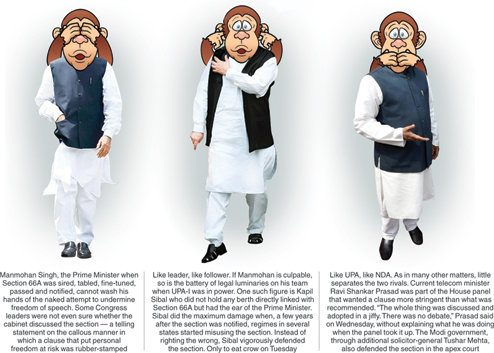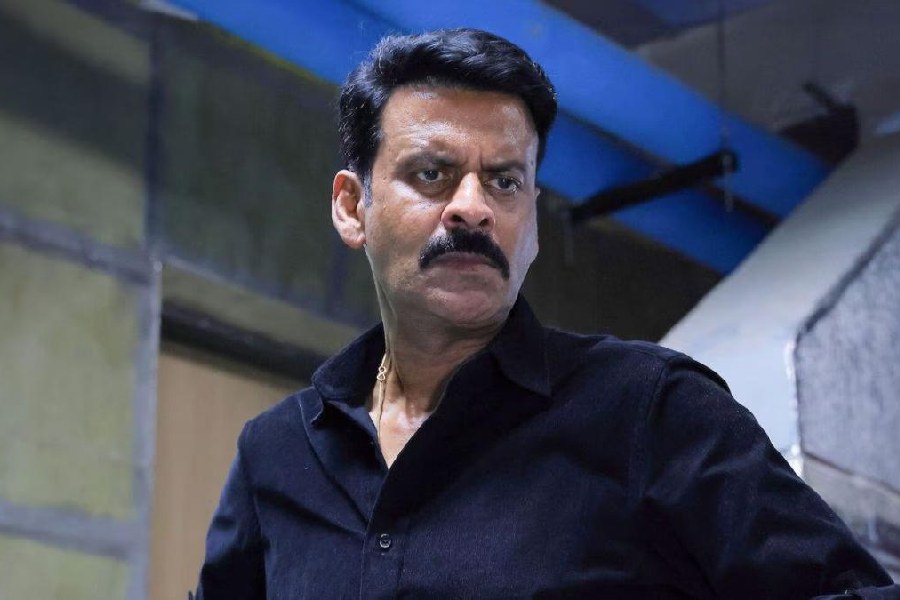In 21 minutes, you can plate up 10-plus packets of Maggie two-minute noodles.
In 21 minutes, you can listen to at least seven Bollywood chart-busters.
In 21 minutes, you can travel from Tollygunge to Chandni Chowk in the Calcutta Metro.
In 21 minutes, if you are George W. Bush, you can run over two miles.
In 21 minutes flat, if you were a member of the Indian Parliament in 2008, you could also have passed Section 66A and proved that not everyone needs to sport a toothbrush moustache to trample personal freedoms under jackboots.
Section 66A, the cyber clause used by regimes in several states to arrest critics that was struck down by the Supreme Court on Tuesday, was moved for passage in the Lok Sabha at 3.03pm on December 22, seven years ago. At 3.24pm, the bill was passed, according to records on the website of the people's House.
The following are answers to your questions on the Great Betrayal of 2008.
♦ Whose baby was Section 66A?
By all accounts, a coterie close to then Prime Minister Manmohan Singh fathered the section.
A section of the Congress's in-house lawyers, such as Kapil Sibal, Ashwani Kumar and, to a lesser extent, Pawan Bansal and Anand Sharma had made a strong case for it.
Both Sibal and Ashwani used to flaunt their proximity to Manmohan. They were subsequently referred to as members of a committee whose prefix rhymed with "core" but was different from the core committee that had A.K. Antony, Ahmed Patel and P. Chidambaram as members.
The main agenda of the parallel committee was to protect Manmohan, who had Sonia's blessings in the UPA but was not popular among many Congress veterans, from adverse publicity. Another member of this committee was Manmohan's principal secretary T.K.A. Nair, a Malayali IAS officer from the Punjab cadre.
Congress sources said Sibal was always alive to the uploading of disparaging and defamatory content, particularly those related to Manmohan, Rahul and Sonia Gandhi, on social networking sites. He repeatedly asked these websites to remove all such content or face action.
However, when Section 66A made its way through multiple administrative and legislative layers, Sibal was not in charge of either the ministries of information technology or law. He headed law when UPA-II was in power.
Salman Khurshid, who was not in the UPA-I ministry, told The Telegraph: "There were vicious campaigns on the Internet against people, religion, groups... complaints came from different quarters. Women were targeted viciously. Experts said India didn't have adequate laws to combat cyber crime. In fact, during UPA-II, the campaign was so vicious that it would not be permitted anywhere in the world. Kapil Sibal as telecom minister (2011-14) tried to discuss the problem with service providers... they were very co-operative. Some extremely offensive contents were blocked."
♦ When was the bill passed?
Section 66A was part of the Information Technology (Amendment) Bill, 2006. The bill was passed by the Lok Sabha on December 22, 2008, and the Rajya Sabha passed it the following day.
A. Raja, the then information technology minister, piloted the bill in both Houses. The bill was introduced in the Lok Sabha on December 15, 2006, and then referred to the standing committee. The introduction was done by then junior minister Shakeel Ahmad (Congress) on behalf of then IT minister Dayanidhi Maran (DMK).
♦ Who was the law minister then?
H.R. Bharadwaj. He told Times Now on Wednesday night that Section 66A was inserted at the instance of a Congress minister from Tamil Nadu who was desperate to protect his family honour in the face of certain uncomfortable revelations.
"I don't remember the name but (you) find out who was facing family trouble at that time. Something had come on Facebook. This Section 66A was hurriedly brought to prevent those things," Bharadwaj said.
Asked if the person was from the Congress, he said: "Yes, a minister from Tamil Nadu."
Although Bharadwaj did not take names, he said the same combination of ministers was going on television to defend the Supreme Court order now.
The then Congress ministers from Tamil Nadu included P. Chidambaram, Mani Shankar Aiyar and G.K. Vasan. Chidambaram had taken the initiative yesterday to defend the Supreme Court verdict. Raja and Maran are also from Tamil Nadu but from the DMK.
Raja told The Telegraph on Wednesday: "I cannot recall if it was me or Bharadwaj or someone from the cabinet introduced the bill." He said it was drafted by the law ministry and sent to the IT ministry.
Bharadwaj had been upset with the Congress leadership for some time because he wanted to return as Union minister in UPA-II.
♦ Was Section 66A discussed in the cabinet?
Khurshid said: "I don't think 66A was discussed in the cabinet. But no individual can be blamed. When a law is passed, the entire cabinet has to take responsibility. Parliament makes law and it is wrong to blame individuals."
♦ OK, did Parliament debate the bill?
There was no debate at all. The bill was passed amid din in both the Lok Sabha and in the Rajya Sabha. On December 22 and 23, the functioning of both Houses was disrupted by an Opposition protest to demand the resignation of then minority affairs minister A.R. Antulay for his remarks questioning the circumstances under which Maharashtra ATS chief Hemant Karkare was killed during the 26/11 Mumbai terror attacks.
There was ruckus in the Lok Sabha with the Opposition, particularly BJP members, shouting slogans in the well when the bill was taken up.
The next day - the last day of the winter session - the bill was passed in the Rajya Sabha in a similar fashion amid din and without any debate.
♦ Did any member oppose the bill?
If anyone did so, nobody noticed or heard it in the din. No amendments were moved by the Opposition, despite the presence of then CPM MP Basudeb Acharia, famous for moving amendments and seeking a vote. Acharia said on Wednesday: "I don't remember how the IT bill was passed."
CPI's Gurudas Dasgupta, who was present in the House, said: "The Left had objections and we had moved amendments. But none of the amendments was taken up and the bill was passed in the din. It was an illegal act."
The CPI leader, however, could not remember whether the amendments were related to Section 66A.
♦ What about the standing committee of the House?
The standing committee report was unanimous with no member dissenting when the report was submitted on August 31, 2007.
The report suggests the panel members hardly discussed Section 66A. Its focus was on other sections, mostly related to cyber crime as a threat to national security.
The committee, however, had questioned the need for bringing a separate cyber law and whether laws under the Indian Penal Code and the Criminal Procedure Code were not sufficient. (The IPC has enough laws to tackle all the issues addressed by Section 66A although Khurshid said on Wednesday "separate laws are very much required because of three reasons: nature of crime, need for investigation tools and greater deterrence".)
The standing committee asked these questions to the department of information technology and the law and justice department. Both had supported the need for a separate IT law.
In the final outcome, the standing committee, too, felt the need for an IT law. In fact, the committee went on to recommend more stringent punishment than originally recommended.
The committee said: "In a nutshell, the department's contention is that since people are not getting bail easily, they propose to keep offences under the above Sections non-cognisable. The committee is astonished by such a reasoning. They are of the opinion that facilitation of bail to the alleged offenders of cyber crimes cannot and should not be construed as a valid reason for reducing the quantum of punishment and thereby making it non-cognisable." (A cognisable offence does not require a court warrant for arrest.)
Nikhil Kumar, a Congress MP, was the chairman of the standing committee. It had 30 members drawn from the Lok Sabha and the Rajya Sabha.
Film-maker Shyam Benegal, who was part of the committee, said on Wednesday that he did not recall a "detailed discussion on Section 66A".
"I am sure if you look into the minutes of the meetings we had, I had strongly objected to the section because it is extremely ridiculous. However, I don't remember the section being discussed at length in the committee," Benegal said.
Ravi Shankar Prasad, the current telecom minister and then a member of the committee, said: "The whole thing was discussed and adopted in a jiffy. There was no debate."
♦ What about the new government?
Old habits die hard, in or out of power. Minister of state for home Kiren Rijiju told The Telegraph: "We feel that the Supreme Court has struck it down due to its vagueness. There has to be something, there cannot be a void. So we will examine the issue after a detailed analysis of the judgment."
The minister does not appear to have heard about the prevailing IPC Sections 500, 501 and 502 which deal with defamation, printing or engraving defamatory material, and selling it. IPC Section 504 covers provocation that will cause break in public peace or commission of an offence.
IPC Sections 504 and 505 deal extensively with the offence of circulating statements or reports that can create enmity, hatred or ill-will between different religious, racial, language or regional groups or castes or communities.
IPC Section 507 deals with "criminal intimidation by anonymous communication or having taken precaution to conceal whence the threat comes".
AdditIonal reporting by Sanjay K. Jha, Nishit Dholabhai, Radhika Ramaseshan, Ananya Sengupta and Sumi Sukanya











